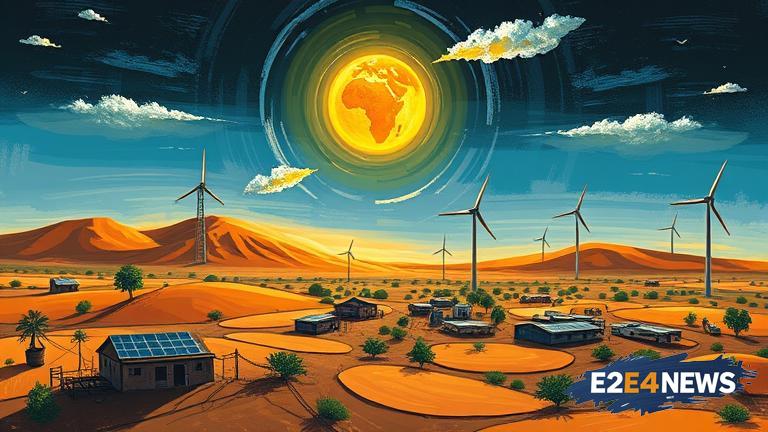The African continent is witnessing a significant shift towards renewable energy, driven by the need to address the pressing issues of energy access, energy security, and climate change. With many countries still struggling to provide reliable and affordable electricity to their citizens, renewable energy has emerged as a viable solution. Solar and wind power are leading the charge, with countries like South Africa, Egypt, and Morocco investing heavily in these sectors. The African Renewable Energy Initiative, launched in 2015, aims to achieve at least 300 GW of renewable energy capacity by 2030. This ambitious target is expected to create new economic opportunities, stimulate growth, and improve the overall quality of life for Africans. The use of renewable energy can also help reduce greenhouse gas emissions, contributing to global efforts to combat climate change. Furthermore, renewable energy can enhance energy independence, reducing reliance on imported fossil fuels and promoting regional cooperation. In addition, the development of renewable energy infrastructure can create new job opportunities, both directly and indirectly, and stimulate local economies. Many African countries are also exploring the potential of hydrokinetic energy, geothermal energy, and bioenergy to diversify their energy mix. The private sector is playing a crucial role in driving the growth of renewable energy in Africa, with companies like Vestas, Siemens Gamesa, and Goldwind investing in wind and solar projects across the continent. Governments are also implementing policies and regulations to support the development of renewable energy, such as tax incentives, feed-in tariffs, and net metering laws. However, despite the progress made, significant challenges remain, including the high upfront costs of renewable energy technologies, lack of infrastructure, and limited access to financing. To overcome these challenges, international cooperation and investment are essential, with organizations like the African Development Bank, the International Renewable Energy Agency, and the World Bank providing critical support. The growth of renewable energy in Africa is also expected to have a positive impact on the environment, reducing air and water pollution, and promoting sustainable land use. As the continent continues to urbanize and industrialize, the demand for energy is expected to increase, making it even more critical to invest in renewable energy. The African Union’s Agenda 2063, which aims to transform the continent into a prosperous and peaceful region, recognizes the importance of renewable energy in achieving this vision. In conclusion, the renewable energy revolution in Africa is gaining momentum, driven by the need to address energy access, energy security, and climate change. With the right policies, investments, and international cooperation, the continent can unlock its vast renewable energy potential, driving growth, improving lives, and promoting sustainable development. The future of energy in Africa is renewable, and it is essential that governments, private sector companies, and international organizations work together to make this vision a reality. As the world transitions to a low-carbon economy, Africa has the opportunity to leapfrog traditional fossil fuel-based development and emerge as a leader in the global renewable energy market. The benefits of renewable energy are numerous, and it is essential that the continent continues to invest in this sector to achieve a sustainable and prosperous future. With the African Continental Free Trade Area (AfCFTA) expected to increase trade and investment across the continent, the growth of renewable energy can play a critical role in supporting economic development and integration. In the coming years, it is expected that renewable energy will become an increasingly important part of Africa’s energy mix, driving growth, reducing poverty, and promoting sustainable development.
